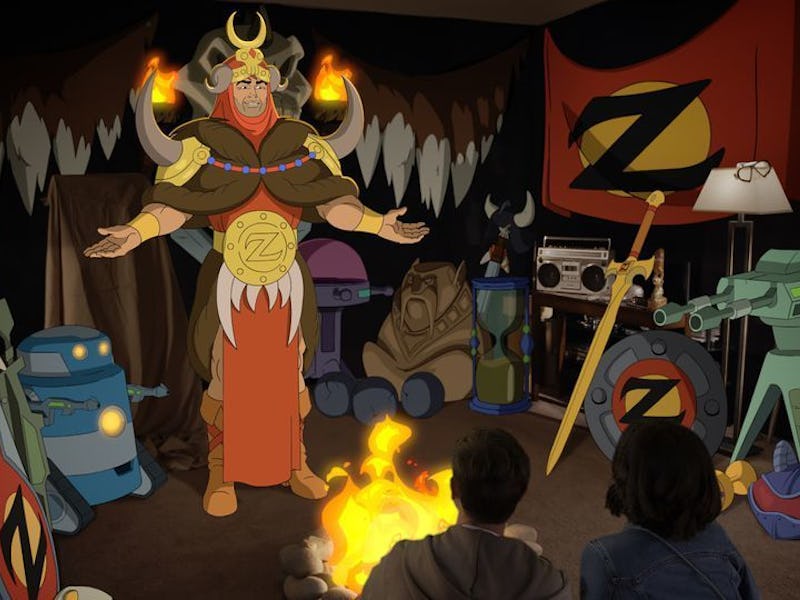'Son of Zorn' Strives for Black-ish Comedy
The FOX sitcom wants to be a harsh, satirical take on otherness. It isn't.

Son of Zorn relies on a fish-out-of-water premise, but even though Zorn is an outsider in Orange County, he’s not actually an outsider on network television. Paradoxically, the norms he embodies, which the show mocks, still dominate the TV form in such a way that episodes of the FOX pseudo-sitcom play as fish-in-water snippets within the Sunday line-up. Zorn is sexist, heteronormative, and all about an outdated status quo. The only thing more network than that is to be two-dimensional, which he literally is.
“It’s 2016. Are people okay with this kind of racism?” Zorn asks in Episode 5 of Season 1. It’s a valid question, but one that this show doesn’t seem totally prepared to answer.
Thematically, “A Taste of Zephyria” is the most ambitious episode Son of Zorn has ever tackled because it circles around on itself. Zorn becomes outraged when a human sitcom called “I’ll Have What He’s Stabbing” portrays a meatheaded, bloodthirsty Zephyrian as a caricature. He worries that this is how people see him and then realizes that his son Alan, despite being mixed race, has little respect for Zephyrian culture. In typical fashion, Zorn tries to teach Alan about his heritage but comes on too strong, embarrassing him in front of his latest crush, the diversity-loving photographer for the school yearbook.
The writers are comprehensive in their approach to making Zorn a metaphor for otherness and cultural difference, but this doesn’t feel honest or authentic. It feels a bit like equating generational differences with ethnic ones or bad behavior with a cultural identity.
There are several TV shows that tackle identity issues in a challenging way, including ABC’s Fresh Off the Boat and Black-ish. But both of those shows portray families that exist outside of the televised norm. Anthony Anderson plays a Black father who faces sitcom conflicts as he navigates what it means to raise upper-middle class, African-American children in 2016. It’s specific. Randall Park plays an immigrant father raising first-generation Americans in 1995. Also specific. Both embody that fish-out-of-water premise without getting lost in the premise itself. The characters are too busy trying to build lives for themselves to view the world in a meta way.
Zorn isn’t. This is why Son of Zorn’s arc has always been confusing. It has never been quite clear if we’re supposed to root for Zorn or merely gawk at his insensitivities. In the case of Andre and Louis, we know that they’re doing their imperfect best. In the case of Zorn, we’re not so sure. His differences seem to be a choice and, more than that, a choice to not acknowledge the differences of others in an empathetic way.
When Zorn takes Alan to a supposedly authentic Zephyrian restaurant full of non-Zephyrian waiters and non-Zephyrian food, it’s easy to draw the parallel to specific ethnic experiences in America. But there can’t be real specificity here because this show isn’t about compromising between modern American mores and Zephyrian heritage. The show reads more as a send-up of Black-ish and Fresh Off the Boat than a parallel effort.
It’s hard to swallow a supposedly subversive take on pop culture and how it portrays cultures that go against television’s dominant narrative when those portrayals still feel rare and precious. A metaphor for difference simply isn’t as interesting or as powerful as seeing actual difference on the screen, and a two-dimensional character just doesn’t quite cut it in that department. Son of Zorn is finally becoming the satire that it wants to be, but its aim is off.